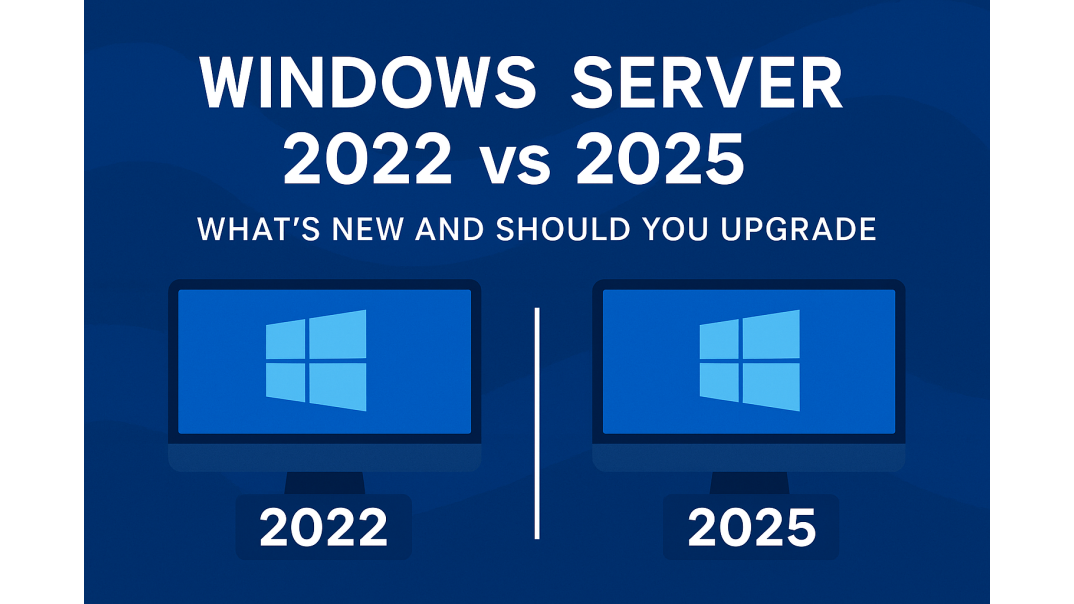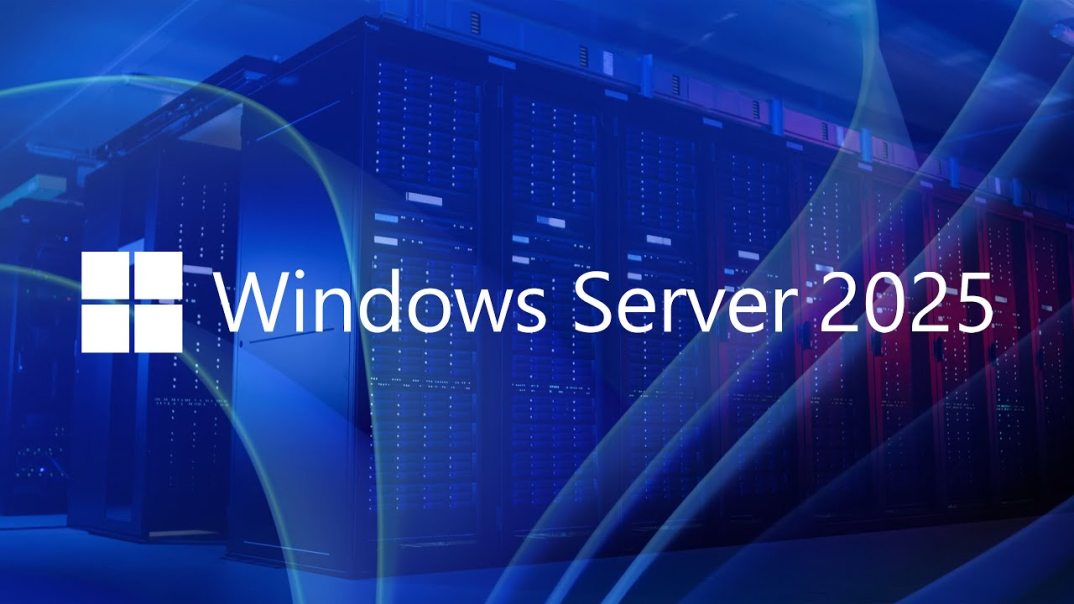Windows Server 2025 has been available for some time, and many IT teams have already upgraded. If you're still running Windows Server 2019 or 2022, you’re missing out on essential performance, security, and lifecycle improvements.
Upgrading isn’t just about access to new features. It helps ensure your infrastructure remains secure, supported, and aligned with Microsoft’s long-term roadmap. With end-of-support deadlines approaching, delaying your upgrade increases the risk of compliance issues and downtime.
✅ Ready to upgrade? Get your Windows Server 2025 Standard or Windows Server 2025 Datacenter product key from Brytesoft.
Check Windows Server 2025 System Requirements
Ensure your hardware and environment are correctly set up.
Minimum Requirements:
- Processor: 1.4 GHz, 64-bit compatible
- RAM: 2 GB minimum (512 MB for Server Core)
- Disk Space: 32 GB minimum, 60+ GB recommended
- Firmware: UEFI with Secure Boot
- TPM: TPM 2.0 required
- Display/Input: VGA display, keyboard, and mouse
Available Editions:
- Standard
- Datacenter
📌 For more details, see Windows Server 2025 Features & Editions.
Preparing for the Upgrade
Follow this checklist to ensure a smooth upgrade:
-
Back up your system
Use Windows Server Backup or another trusted tool, and test the restore process. -
Check compatibility
Confirm third-party apps and roles are supported on Windows Server 2025. -
Validate your product key
A new product key is required. Keys from 2019 or 2022 won’t work.
How to Upgrade from Windows Server 2019/2022 to 2025
Option 1: In-Place Upgrade
Use this when:
- Your current hardware is still reliable
- You want to preserve roles and settings
- Your applications are compatible with Server 2025
Steps:
- Mount the Windows Server 2025 ISO
- Run setup.exe
- Choose Keep personal files and apps
- Complete the setup wizard and restart
- Enter and activate your Server 2025 product key
Option 2: Clean Install and Migration
Use this when:
- You’re moving to new hardware
- You want to start fresh for performance or security reasons
- You’re switching editions (e.g., from Standard to Datacenter)
Steps:
- Back up your data and server roles
- Perform a clean install of Windows Server 2025
- Reinstall roles and restore configurations
- Validate everything is working as expected
📌 Still comparing options? Read: Windows Server 2022 vs 2025
📘 Step-by-step installation: Windows Server 2025 Standard & Datacenter Guide
👉 Ready to dive deeper? Explore Windows Server 2025
Post-Upgrade Best Practices
After upgrading, take the following steps:
- Run Windows Update to get the latest patches
- Check event logs for upgrade errors
- Verify functionality of Active Directory, DNS, DHCP, and file shares
- Enable monitoring tools to track system health
- Update Group Policy Objects as needed
Common Issues and Fixes
| Problem | Fix |
|---|---|
| Driver conflicts | Install updated drivers from vendor support pages |
| Activation errors | Use a valid Server 2025 product key |
| Role or service issues | Reinstall or reconfigure the affected components |
| Performance issues | Check resource usage, update firmware, and tune settings |
Why Upgrade to Windows Server 2025?
Security & Compliance Improvements
Windows Server 2025 includes several critical security upgrades:
- TPM 2.0 and virtualization-based security (VBS) are enforced by default
- Secured-core server features are built in
- Enhanced Credential Guard and Windows Defender
- SMB over QUIC improvements for secure file transfers over public networks
These features help you meet evolving compliance requirements and protect against modern threats.
Performance Enhancements & Virtualization
Windows Server 2025 improves system performance and virtualization capabilities:
- Increased Hyper-V scalability and efficiency
- Enhanced Storage Spaces Direct with lower latency and higher throughput
- More efficient container handling
- Faster startup, provisioning, and failover
This is particularly important for any organization that uses virtualization or runs intensive workloads.
Cloud & AI Capabilities
Server 2025 supports cloud-connected features without requiring full cloud adoption:
- Native Azure Arc integration
- Improved onboarding with Azure Backup, Azure File Sync, and Azure Monitor
- Compatibility with AI-assisted tools for diagnostics and performance tuning
These features give you the flexibility to extend workloads to the cloud as needed.
Extended Support Lifecycle
Windows Server 2025 follows Microsoft’s Long-Term Servicing Channel (LTSC) model:
- Mainstream support until 2030
- Extended support until 2035
This provides you with a decade of updates and a stable platform to build upon.
📌 Want a full feature breakdown? Read: Windows Server 2022 vs 2025: What’s New and Should You Upgrade?
Windows Server 2019 vs 2022 vs 2025 – Key Differences
| Feature / Edition | Windows Server 2019 | Windows Server 2022 | Windows Server 2025 |
|---|---|---|---|
| Release Year | 2018 | 2021 | 2024 |
| Mainstream Support Ends | Jan 9, 2024 (ended) | Oct 13, 2026 | 2030 |
| Extended Support Ends | Jan 9, 2029 | Oct 14, 2031 | 2035 |
| TPM 2.0 / VBS Enforcement | ❌ | Optional | ✅ (required) |
| SMB over QUIC | ❌ | ✅ | ✅ (improved) |
| Secured-Core Server | ❌ | ✅ | ✅ (expanded) |
| Azure Arc Support | Limited | Improved | ✅ (native) |
| AI Monitoring Compatibility | ❌ | ❌ | ✅ (ongoing rollout) |
Final Thoughts
Windows Server 2025 is a stable, secure, and future-ready platform. It’s already in production across industries and continues to receive regular updates and support from Microsoft. If you’re still using Server 2019 or 2022, upgrading now ensures you stay protected and efficient.
✅ Avoid performance gaps and support risks. Upgrade now with a Windows Server 2025 Standard or Datacenter product key from Brytesoft.
FAQ About Upgrade to Windows Server 2025 from 2019/2022 (Full Guide)
Can I upgrade directly from 2019 or 2022?
Yes. Windows Server 2025 supports direct in-place upgrades from both Windows Server 2019 and Windows Server 2022.
Do I need a new product key to upgrade from Windows Server 2019/2022 to Windows Server 2025?
Yes. A new product key is required for upgrading from Server 2019 or 2022 to Server 2025.
Is an in-place computer upgrade or a clean install better for upgrading Windows Server 2019/2022?
In-place upgrades are quicker and preserve your setup. Clean installs offer better performance and stability, especially with new hardware.
Will my existing roles and features carry over during the server upgrade?
Yes, most roles and features are retained during an in-place upgrade, but it’s recommended to verify compatibility and test in a staging environment first.
How do I verify that my hardware meets the requirements for Server 2025?
Begin by comparing your current hardware specifications with the official system requirements listed on our Windows Server 2025 product page. You can also use tools like systeminfo in PowerShell or third-party audit utilities to gather your server’s current configuration. This will help confirm compatibility before proceeding with the upgrade.







